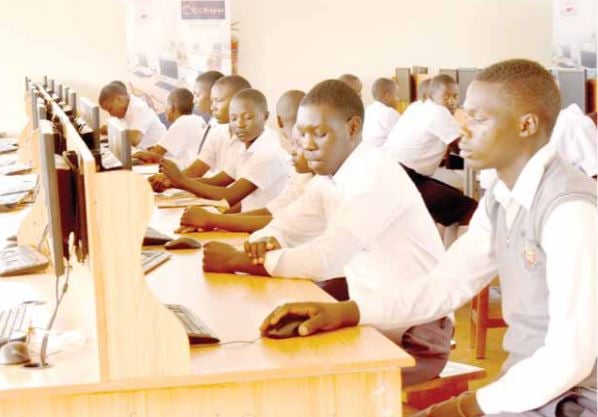How ICT is changing the education landscape in Rukiga

Learners in the ICT lab at Kihanga Secondary School. PHOTO | TREVOR LUTALO
What you need to know:
- Mr Simeo Bazirake, an ICT teacher who doubles as the ICT department head at the school says it used to be an uphill task for him to attend to over three hundred (300) learners with only eight computers.
Where the roads that encircle the hills of Mparo Town Council in Rukiga district get higher and more steep, and the dust creates a fog-like atmosphere amidst narrow roads that cut through man-made forests and houses sprung apart from each other, then you’re certainly closer to Kihanga village that is home to one of the oldest schools in the Kigezi region, Kihanga Secondary School.
Kihanga Secondary School is a government-aided school that serves over 1,200 learners from Rukiga and beyond. Through her gates, many natives of Kigezi have received an education that has propelled them further in life with some competing with the privileged few at the national level and others becoming decision-makers in the country.
With the global education needs oscillating towards the dot com era and the government redesigning its curriculum to put more emphasis on Information and Communications Technology (ICT) education across secondary schools, it is hard for Rural schools to cope with the grueling demands in terms of facilities, human and non-human resources.
In the rural areas of Uganda, numerous young learners face significant challenges in pursuing their dreams, particularly in technology. Kihanga has been able to change her fortunes with a donation of 50 computers, internet routers and a smart board from the International Community of the Banyakigezi (ICOB) earlier this year which has greatly changed their computer laboratory.
Mr Simeo Bazirake, an ICT teacher who doubles as the ICT department head at the school says it used to be an uphill task for him to attend to over three hundred (300) learners with only eight computers.
“The nature of this subject (ICT) is hands-on, we previously found ourselves having 10 students per computer during lessons before ICOB came to our rescue. This has been solved with two students per computer, an improved ratio. Teaching has been made easy for me with the smart board. I can show learners more realistic illustrations which have improved their performance in the discipline,” he explains.
“Our only challenge remains the erratic power outages that affect our learning timetable, this is a problem faced by the entire district. We need a more stable power source other than the national grid to efficiently handle the situation,” Mr Bazirake adds.
Oscar Ndyomugabe, a 20-year-old senior six learner says the new facility has helped him see beyond ICT as a subject, he now envisions himself building a career in this particular field.
“I chose ICT because of my passion for it and also because I think it is profitable to society. I want to do a course related to ICT at the University. I have been able to expand my research over the internet. I am now able to perform some software solutions for people back home, like installing windows and fixing phone software,” he explains.
Similarly, another senior six student, Elizabeth Akandida says her grades have tremendously improved this year owing to the help of the facility.
ICOB’s Dr Munini Mulera says this project is a continuation of their efforts since 2003 to develop Kigezi.
“This is a fulfilment of one of our core goals as an organisation which is to promote the cultural, social and economic development of Banyakigezi in Uganda and the diaspora. If we contribute to the growth of education in the region we can inspire a new generation of leaders and professionals across the board. This is critical for the future of Uganda,” Dr Mulera says.
Community benefits
During school breaks and vacations, using this facility, locals can enroll for ICT-related short courses in small cohorts. The courses have been curated to give basic and mid-level computer skills to willing locals at no cost.
“We have identified baseline digital skills, especially those that are critical for work and requested by employers. In this modern age, it is important to equip everyone with basic computer skills which are important for daily life,” says Mr. Bazirake
He further says that they are still thinking of a way to integrate the short programmes into the school timetable during the weekend which will be a plus for the community.




